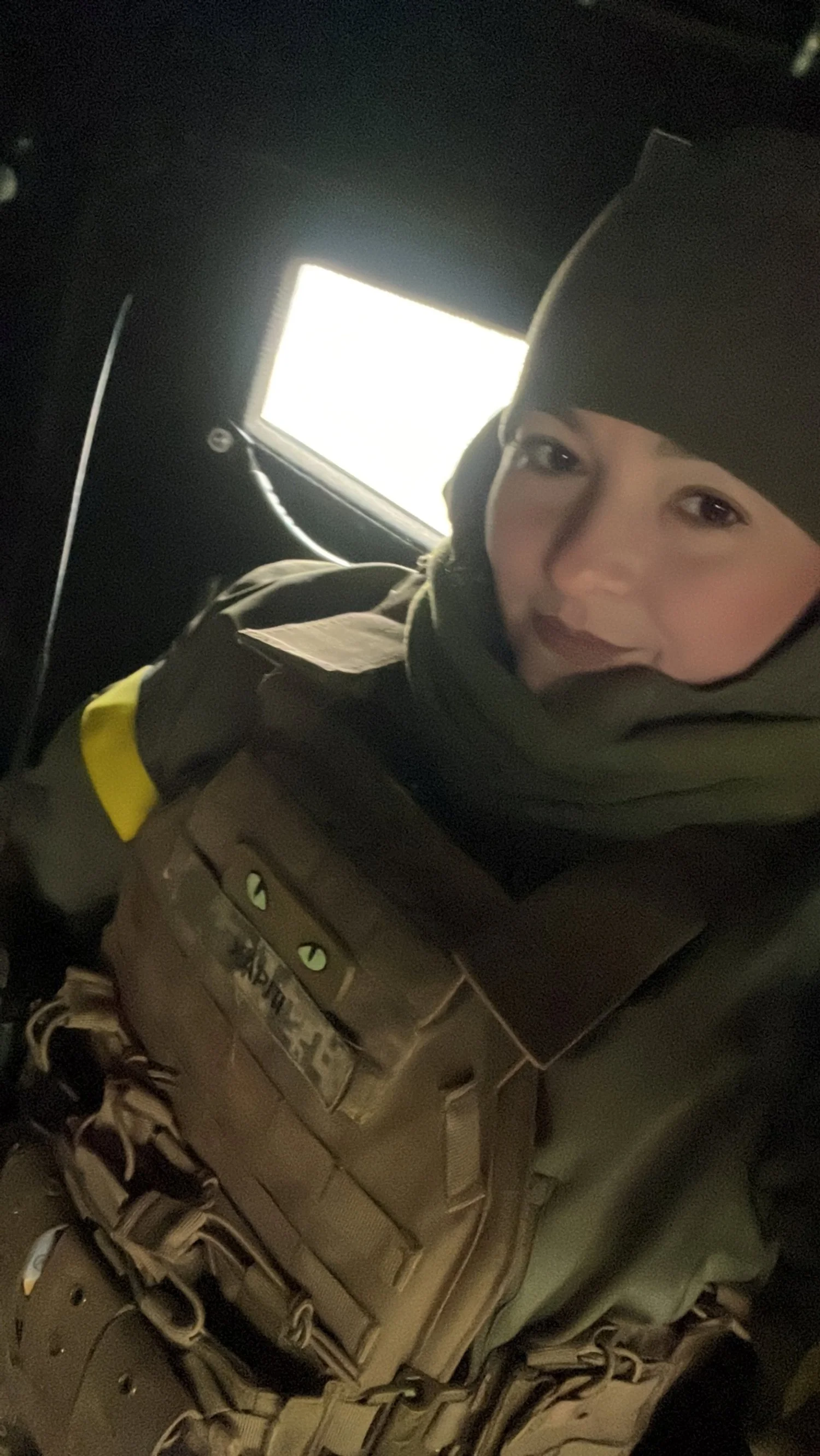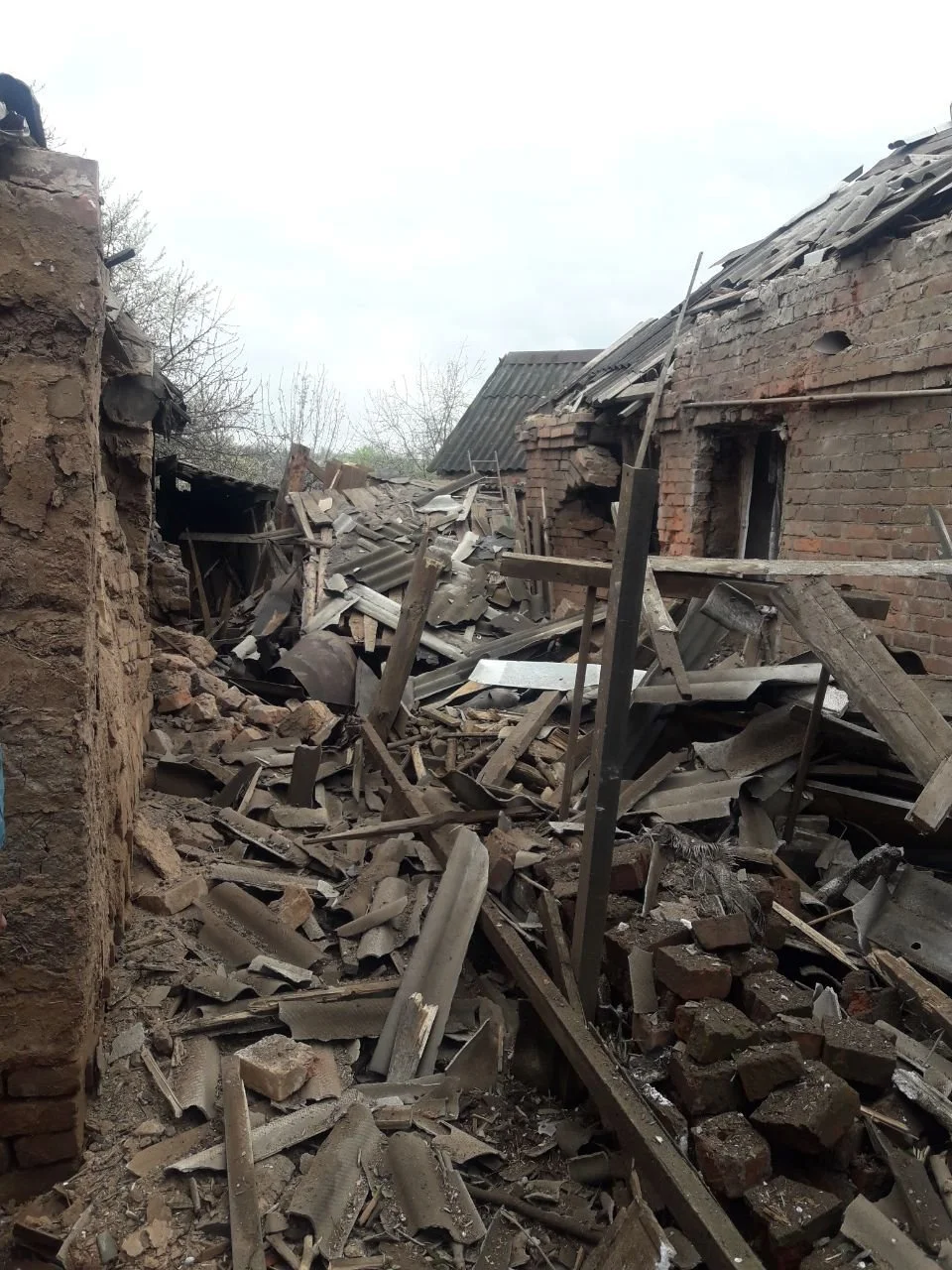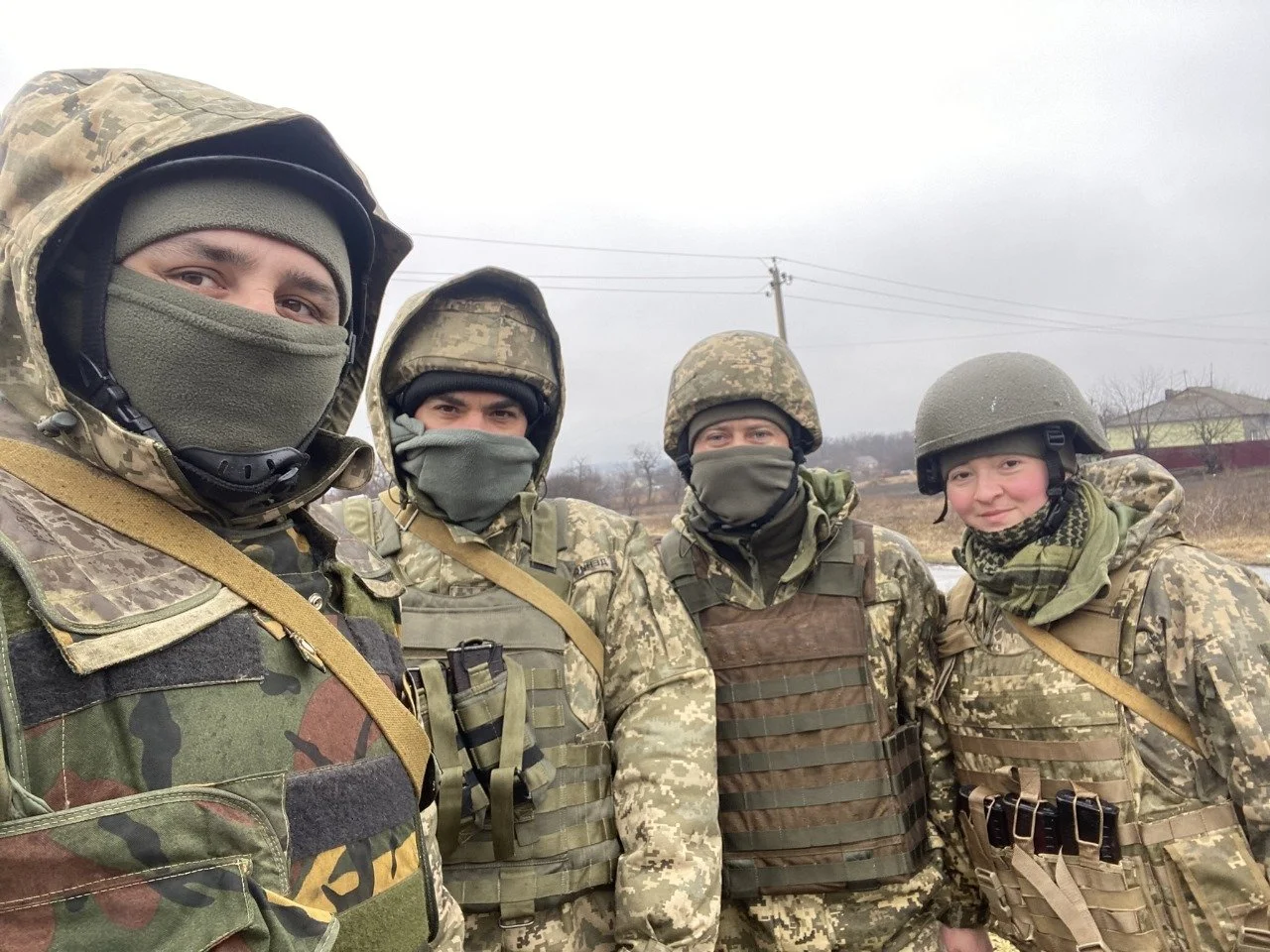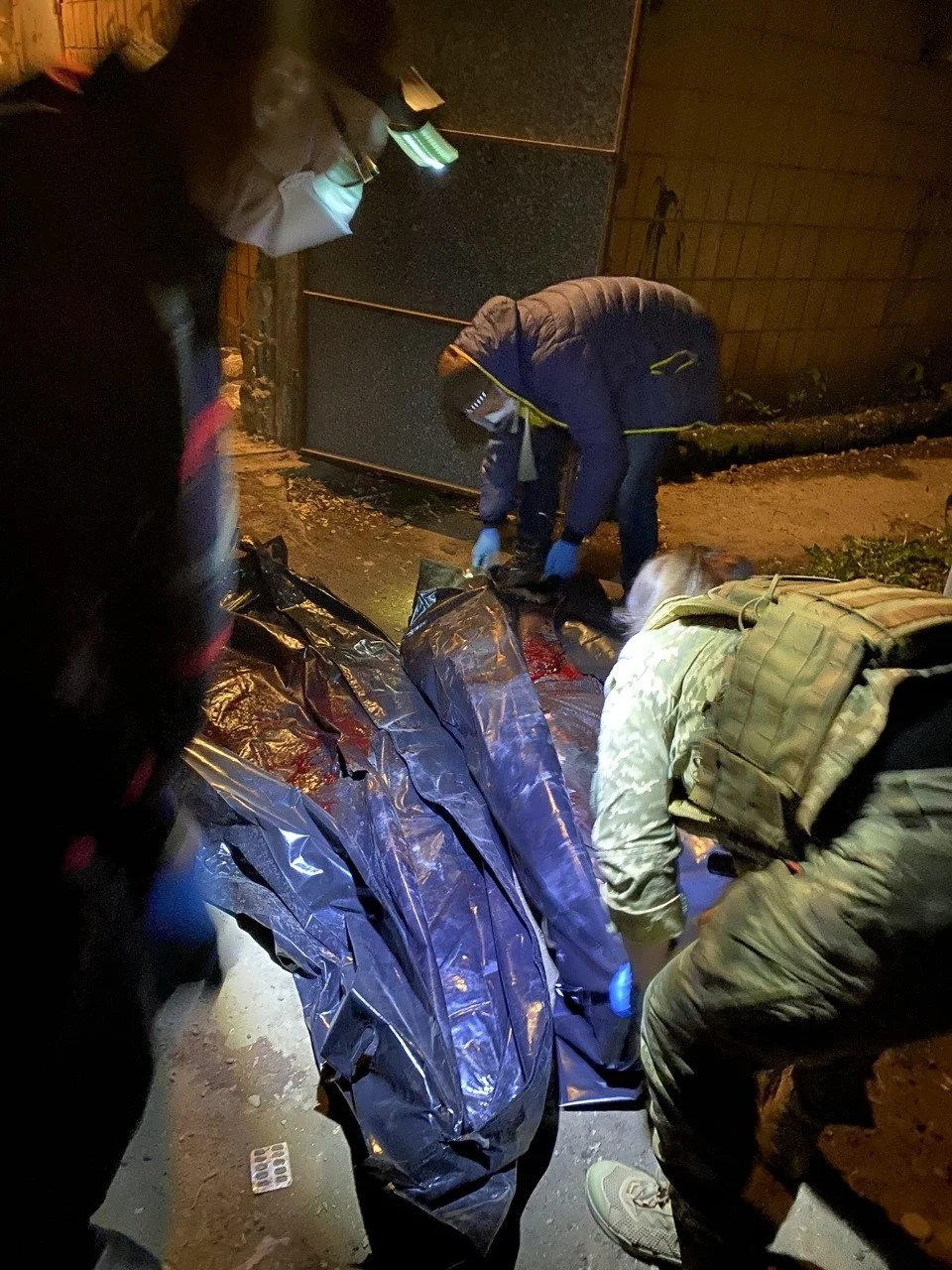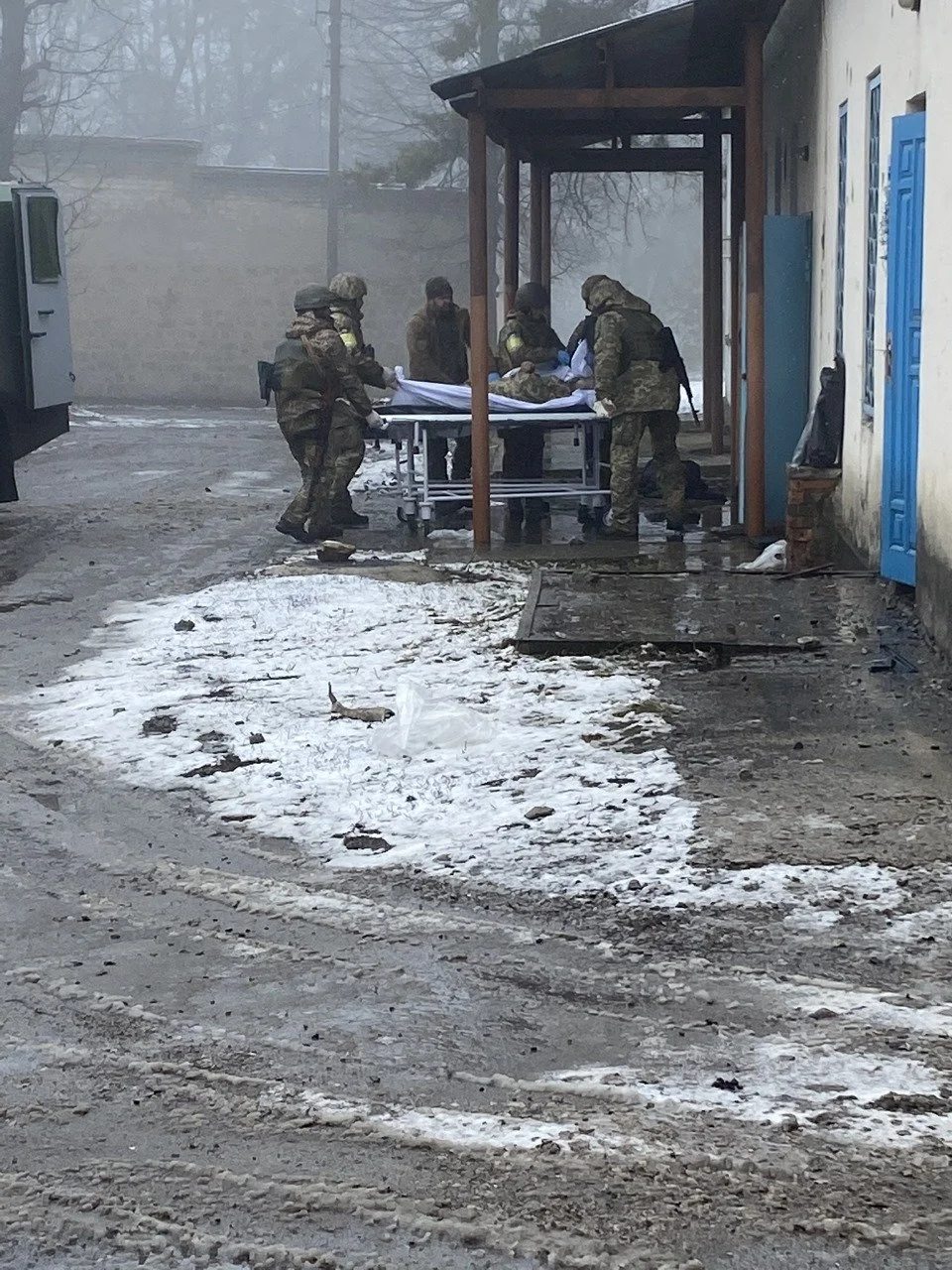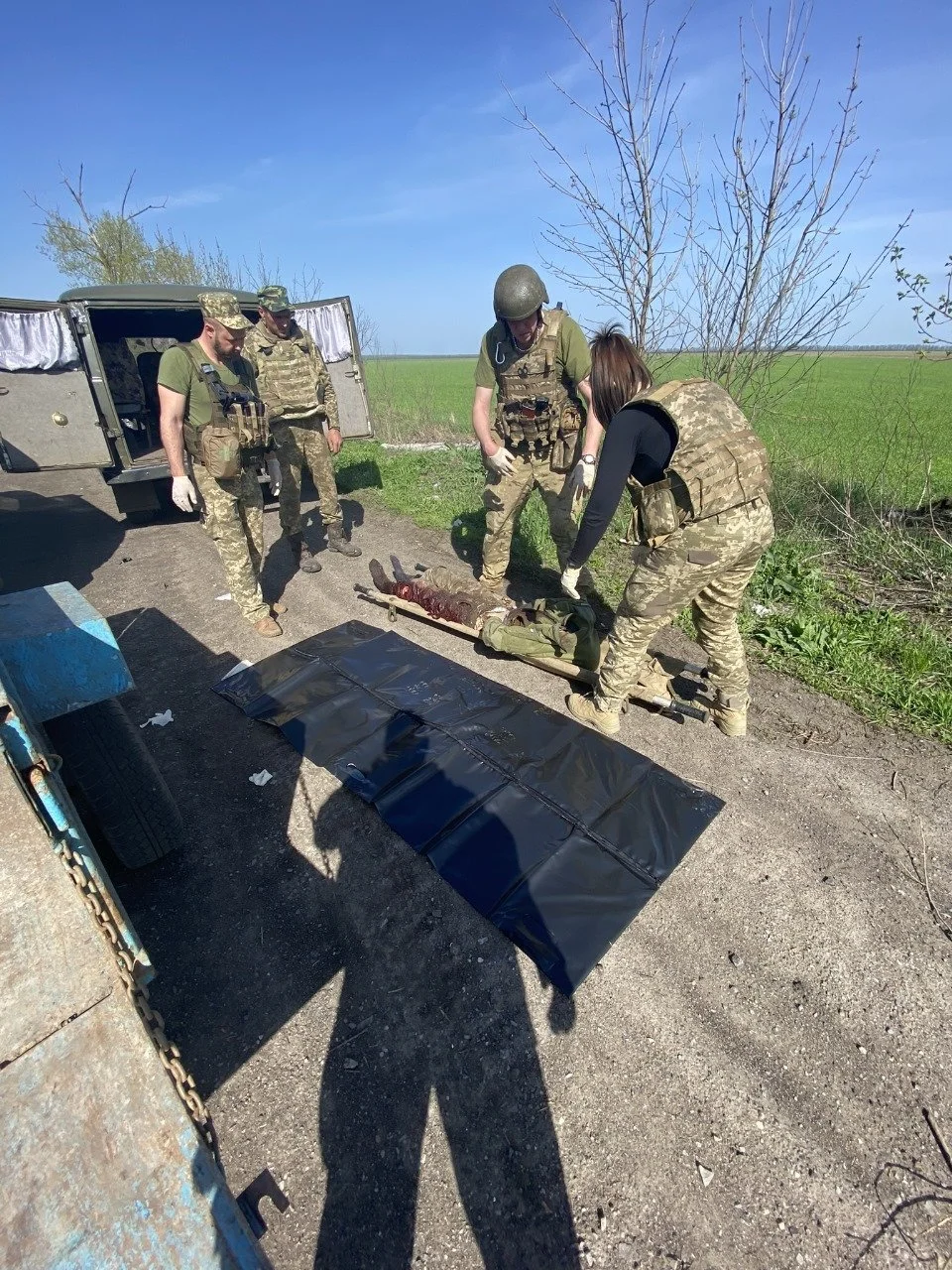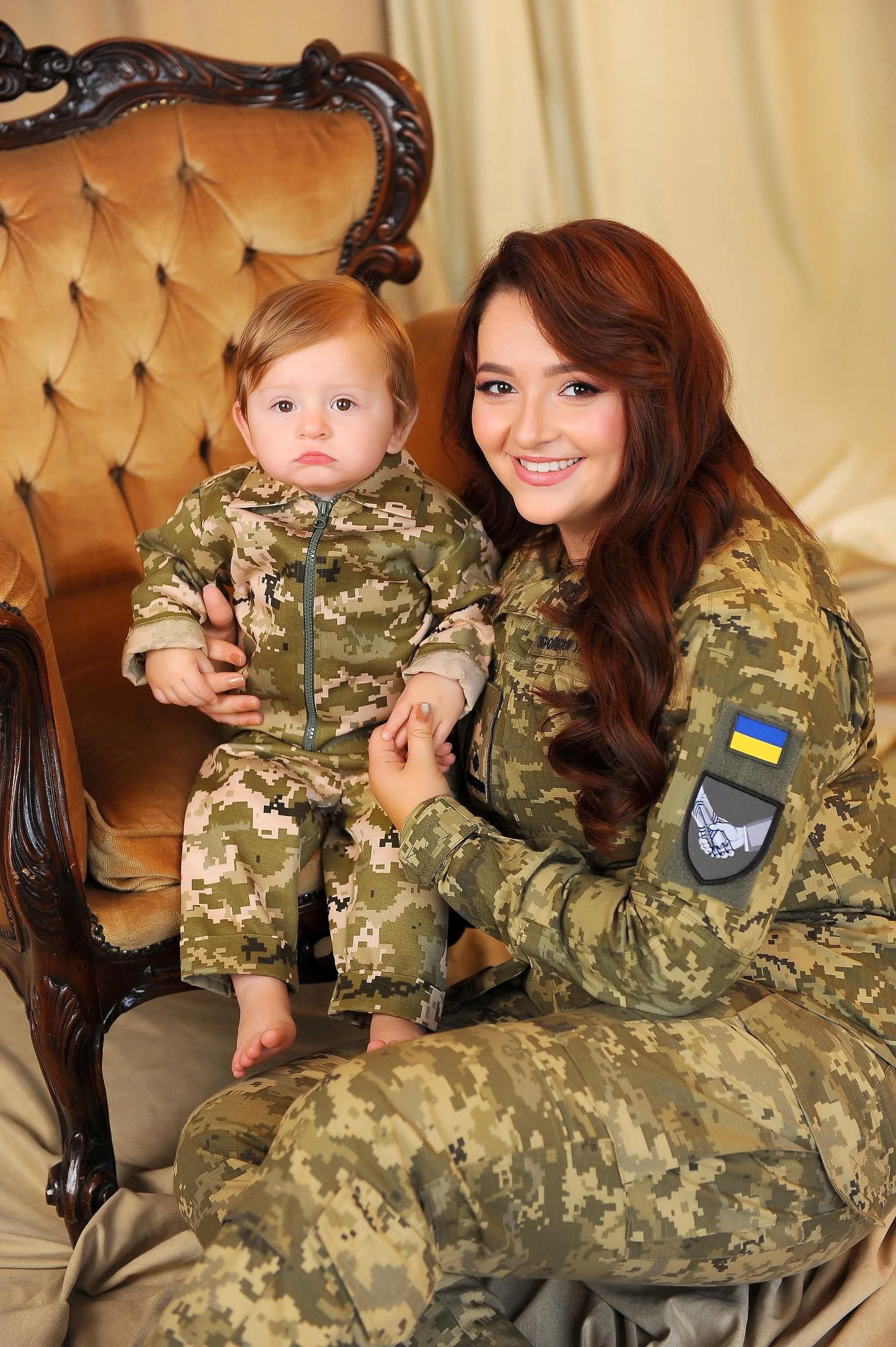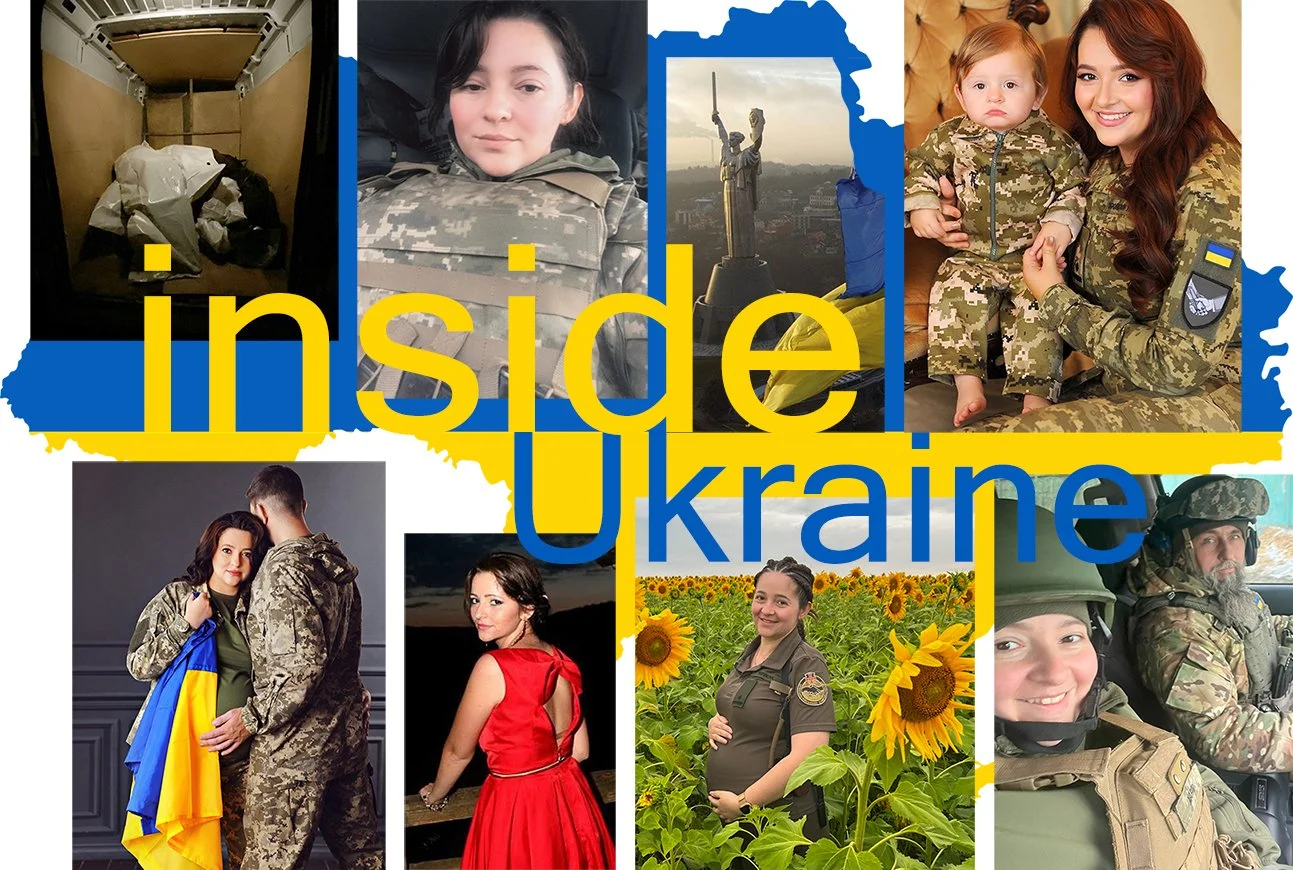THIS INSIDE UKRAINE STORY IS FROM THE CITY OF Dnipro.
* All images and answers in the feature were provided by the WOW Woman.
INSIDE UKRAINE SERIES: A SNAPSHOT, A DAY-IN-THE-LIFE, A GLIMPSE OF WHAT IT’S LIKE TO LIVE, RESIST, SURVIVE AND PERSEVERE IN A NATION UNDER ATTACK.
GLORY TO THE UKRAINIAN WOW WOMEN, FOR SUPPORTING THEIR COUNTRY AND BRINGING UKRAINE CLOSER TO VICTORY.
This interview features Khrystyna Biliaieva, a military psychologist serving in the Armed Forces of Ukraine since 2019. Originally from Lviv and now based in Dnipro, she has served her country since before russia launched its full-scale invasion. But if you’re picturing an office where Khrystyna quietly meets clients for therapy sessions, you’re imagining the wrong battlefield.
“My task was to evacuate the bodies of our soldiers for identification and return them to their families for a dignified burial.”
Khrystyna speaks about the first days, months, and years of the war, when she evacuated fallen soldiers and civilians under constant russian shelling. She continued this work even while pregnant and later returned to service after maternity leave to rejoin her brigade alongside her husband, who also serves in the Armed Forces. She also participated in prisoner exchanges directly at the frontline and assisted civilians in recently de-occupied Ukrainian territories.
Khrystyna’s lived experiences and dedication to Ukraine exemplify strength and resilience of Ukrainian women who continue to serve, protect, and sacrifice their lives for their country in the face of russia’s ongoing war. Her account offers a direct and unfiltered perspective on duty, survival, and the human cost of russia’s invasion of Ukraine. This was one of the most painful interviews to translate and I am profoundly proud and pained to have to shine light on such an extraordinary Ukrainian warrior, my hero.
- Olga Shmaidenko, Founder of WOW Woman.
Military Psychologist, BraveHeart, Armed Forces of Ukraine, Dnipro
1. Name.
Khrystyna Biliaieva.
2. Where were you born and where do you live now?
I was born in Lviv and now I live in Dnipro.
3. What did you study and what is your current profession?
I studied psychology but later retrained as a military psychologist.
Lviv, Ukraine.
4. What did your ordinary day look like before the full-scale invasion, and how has your life changed since russia invaded Ukraine? What does your typical day look like now, if that’s even possible?
My ordinary day before February 24, 2022, the start of the full-scale, included working in the military. I have been serving in the Armed Forces of Ukraine since the beginning of 2019.
In December 2019, I was appointed head of the civil-military cooperation group. In short, my duties included working with the civilian population (assessing the civilian environment in combat zones), working with the families of the dead, missing, wounded, and captured.
The evacuation of the fallen - involves evacuating the bodies of deceased servicemen and delivering them for forensic examination and then for burial at home. This has been part of my duties since January 1, 2020.
5. May I ask you to please elaborate on what your role was before 2022, when you were just starting out? Did you travel with the guys and work with them as a psychologist? What did you learn about them and the army during those first years of working there?
Before the full-scale invasion, I worked with civilians, teaching children in frontline cities about mine safety and tactical medicine. We collaborated with various humanitarian organizations. We also evacuated the bodies of the dead from the positions, because they were there then (since the initial russian invasion of 2014), but at that time we were not afraid that a rocket might hit us in the head during the evacuation.
As for my work as a psychological officer, that was from early 2019 until December 2019. The guys just needed someone to talk to and support, and the main thing was that I came to their observation posts and they were surprised that a woman could come there and not be afraid. In fact, I was very scared, but I tried not to show it so that they would be more courageous. Most men think that women sit in headquarters and sort through documents, but that's not entirely true. By my example, I showed them that I was there for them and that I would support them, and I also wanted them to protect and support me.
6. Did you have military personnel reporting to you? Can you please describe that structure and set up?
Yes, I had subordinates. At first, I worked alone, but by February 2022, I had two military personnel under my command. These two guys were the first subordinates with whom I was not afraid to go to the orc positions. Igor and Alexei always supported me and covered my back.
Then, by decision of the senior command, they were taken away and transferred to other units, and then I started looking for guys in my unit who could evacuate the dead with me. Not everyone could withstand such psychological pressure, so there were moments when some transferred to another unit, and I was again looking for new servicemen who could do such work. The maximum number of subordinates was 10 soldiers.
7. Do you communicate with the families of soldiers after you have returned their bodies? Does your education as a psychologist help you in these cases?
My education as a psychologist helps me every day in communicating with military personnel, civilians in an active war zones as well as families of defenders who were killed or gone missing. I try not to take all the conversations to heart, because otherwise I myself may not be able to bear such a burden.
8. Where were you and how did you learn or feel the start of the russian full-scale attack on Ukraine on February 24, 2022? Where were you during the first days and weeks of the invasion?
On February 24, 2022, I was in Volnovakha, Donetsk region, carrying out combat missions. But I felt the beginning of the offensive on February 17, 2022, when russia began destroying residential buildings by shelling frontline towns with artillery. My team and I drove around all the damaged and destroyed houses, helping local civilians together with the State Emergency Service and the civil-military administration.
“The day russia invaded Ukraine I was in Volnovakha, Donetsk region, where my brigade was carrying out combat missions.
After russia’s full-scale invasion of Ukraine, a lot changed, especially the fact that in the first days of the invasion, I lost many brothers-in-arms, friends, and people whose families were close to mine.
Today, every day carries heaviness in the heart and the pain of losing loved ones.”
9. The world knows about russian attack on Mariupol through the documentary “20 Days in Mariupol.” But you were near there much longer than 20 days. What did you do to survive?
I actually went to Mariupol several times because it is only 50 km from Volnovakha, where I was based and performing combat tasks. My last trip to Mariupol was on February 14, 2022. I bought a dress for our civil wedding registration since my boyfriend and I planned to get married on February 22, 2022. But because of heavy shelling, we realized we’d have to postpone it.
Then came the morning of February 24, 2022, when my heart stopped at every explosion, but I understood that I was a soldier, I had my duties and my personnel, and I had to stay strong.
Under constant artillery threats, we kept moving to find a location for setting up headquarters to continue fighting. When we finally secured a spot in one of the settlements, I was able to return to Volnovakha, where intense fighting was taking place. The “russian orcs” kept advancing and spared no one.
Photo 1. We completed the task and happily returned to our place of rest. We were very happy to be alive. 2. On my way to meet the orcs (russians) to pick up the bodies of our comrades. 3. A visit to our guys who were released from captivity. 4. This photo was taken on December 13, 2022, on the way to a prisoner exchange in the outskirts of the occupied village of Opytne near Bakhmut. 5. In this photo, I am with our deputy commander, helping to administer emergency medical care to a wounded soldier. 6. The consequences of russia.
My task was to evacuate the bodies of fallen soldiers for identification and to return them to their families for dignified burial. Under heavy enemy fire, this was extremely difficult. We had neither enough vehicles nor enough body bags.
At the same time, we also evacuated civilians to safer areas whenever they asked for help. If someone gave us information about the location of bodies in so-called “grey zones,” my group and I went there under the cover of reconnaissance and snipers to retrieve the bodies.
Between March and December 2022, my group crossed into enemy-controlled territory three times to recover the bodies of our soldiers, without any agreements with the enemy. There were no field morgues, so we had to transport the bodies to Dnipro. On the night of March 7, 2022, I transported about 20 bodies to deliver them to the morgue for identification and then hand them over to their families for burial.
During this time, I also took part in field exchanges of prisoners of war. Field exchanges took place by agreement between the orcs and the command, when positions were taken for a couple of days, first the orcs took them from us, and then we took them back with their fighters. And when there is an opportunity to make an immediate exchange, that is what they do. It is often tense, because there is always a possibility that the orcs will violate the agreement and start shooting at us.
On the morning of March 8, 2022, my boyfriend, who had just arrived from Kharkiv, took my hand and said we should register our marriage immediately because no one knew if we’d ever see each other again. On March 8, 2022, I officially became a wife — not in the dress I bought in Mariupol but in uniform, with an assault rifle on my back.
Right after the ceremony, I returned to Volnovakha to continue evacuating my comrades. After Volnovakha came Vuhledar, then Bakhmut, and later Avdiivka.
Photos 1. & 2. Evacuating bodies of Ukrainian defenders killed by russia for identification and burial by their Ukrainian relatives. 3. This is a photo of us driving into the already semi-occupied Volnovakha and picking up our fallen guys. 4. Evacuation of the killed defender.
In February 2023, I found out I was pregnant. That changed me a lot; I developed fear for my child’s life, but it didn’t stop me from doing my work. Until my 30th week of pregnancy, I continued going out on evacuation missions while my brigade defended Avdiivka.
In August 2023, I went on maternity leave, and in June 2024, I returned to the brigade. Today, my husband, who is also a soldier, and I continue to serve in Dnipro, where we live with our daughter.
First photo was taken two weeks before maternity leave; second photo was taken during the evacuation of the killed defenders, the day before I went on maternity leave. Together with my daughter Adelina, in the photos on the right.
10. What do you think are your strengths and superpowers?
I am determined, stubborn, and strong in spirit. My superpowers are surviving where survival seemed impossible and faith in God. I never thought I’d pray so much before every mission, but it worked — despite constant shelling and shrapnel, we always came back unharmed.
Easter at the front: Ukrainian easter cakes, in our helmets, waiting to be blessed by the priest.
11. What specific actions, big or small, have you taken and continue to take to help Ukraine and her people?
I wouldn’t call them big or small, but I am proud that I managed to recover the bodies of my fallen comrades, though I often blame myself for not being able to recover everyone. I still dream of them often, and in my dreams, they thank me for not leaving them behind.
12. Can you describe or try to explain how you crossed the front line to retrieve the bodies of our guys? How did you find them? Was it at night? How deep would you go? You said it was without agreement with the russians - are there sometimes agreements from both sides on the exchange of bodies? How can Ukrainian servicemen look russians in the face during these and not be triggered by hate?
Regarding the evacuation of bodies from uncontrolled territory, we never agreed on anything with the russians. There were moments when we followed the commander's instructions. He pointed to a spot on the map and that was it, that’s where we headed. There were also times when it was planned because we first flew a drone for reconnaissance and saw bodies that, based on their pixel shape, were ours, after which a cover operation was planned. We went at night and during the day, it all depended on whether there was cover or not. There were often moments when we didn't retrieve the bodies on the first try and had to wait. The longest trek for bodies was 3 kilometers from our outermost position, deep into enemy territory.
There at times exist agreements when both sides request silence and then during this silence, you can retrieve your bodies from the gray zone, but no one can guarantee that the orcs won't shoot. As for looking them in the face, I won't even say because I just didn't look. I felt disgust towards them. I just did my job so as not to attract their attention.
13. How do you take care of yourself? Is it even possible to remain mentally stable during war? What helps you pull yourself together?
I don’t really take care of my mental and psychological state — my husband does. I constantly think about others and have no time for myself. When it gets very hard, his support keeps me going.
14. Where do you think you draw your courage from? Your confidence, decisiveness and bravery?
I wouldn’t say I’m brave. It’s more that I never show anyone when I’m afraid. Only my husband knows how scared I can be and how often I cry. For everyone else, I am strong and fearless.
15. Do you feel that the war has changed you? In what way? Were you surprised by yourself — how you endured, stayed strong, found inspiration in unexpected places — by your country, your ideas of humanity, your view of the world? What has been your biggest realization?
Yes, the war changed me a lot. It’s very hard to witness someone’s death, and even harder when it’s a close friend.
It is painful to talk to families who have lost a loved one, or whose loved ones are missing or captured. But the hope that we will win, and that everyone in captivity will return home, keeps me going. I’m waiting for the day when I can go to liberated cities and find those who died there and whom I couldn’t evacuate.
16. What do you want the world to know about Ukrainians right now? About Ukrainian women?
Ukrainian women who stayed in Ukraine are strength, resilience, and the future. They are the ones who will give birth and rebuild the country.
17. Which WOW women inspire you?
Probably my mom, and every mother whose children serve in the Armed Forces of Ukraine.
18. What place or activity makes you happiest?
Spending time with family, anywhere, anytime.
19. What will you do first when Ukraine wins? What do you dream about for yourself and your family after the war?
My dream is to go to Crimea. I dreamed of visiting Crimea my entire childhood, but we didn’t have the financial means. In 2013, I finished my Master’s degree and set a goal to earn enough money to travel to Crimea and spend the entire summer of 2014 there. Well, that year Crimea was occupied by the ruscists.
20. What is your opinion on the nation’s transition to the Ukrainian language?
I’ve spoken Ukrainian all my life. I believe that when you live in a country, anywhere in the world, if you’re a citizen, you must know and fluently speak the state language.
For personal growth, we can learn other languages and use them when needed, but the state language is a guarantee that no neighbor will be able to claim your land just because someone there speaks their language.
21. What was your interaction with russian soldiers like? For those in the West who don’t understand life under occupation and call for “ending the war for the sake of peace,” could you describe “russkiy mir” aka “russian world”?
Yes, I spoke with russian soldiers who were captured. Most of them are either kids who understand nothing about life or people who needed money. And all of them said the same thing — that they came to “liberate” russian speakers. My interactions were only with the wounded who were receiving medical care. For a certain period, my unit lived together with the medics, and we saw all the seriously wounded Ukrainian guys and also the orcs who were receiving medical care. So there were the usual questions: “Who are you? Where are you from? Why did you come to kill us?” It wasn't part of my tasks but I was just curious to hear how they would explain it. After providing them with medical assistance, the orcs were taken away by representatives of the Security Service of Ukraine.
“Russkiy mir” is a “hole,” a big and black one. They have vast lands where people barely survive. Instead of destroying everything and invading neighboring countries, they should work on building up their own.
22. In your opinion, how are russians as a people different from Ukrainians? Did we know these differences before the full-scale war? Were we in denial?
In everything. Ukrainians have nothing in common with the beasts who kill just for fun. It’s even hard to call them beasts, because animals kill to eat, not for entertainment. They are jackals.
23. What justice do you want for Ukrainians when it comes to punishing russia?
I want russia to be dismantled into pieces by all the countries it has occupied and destroyed. I want there to be no such country as russia.
24. How do you see the country’s future, its place in the world and in politics (Europe, NATO, or other alliances)? What role do you see for yourself and your children in Ukraine’s future?
Ukraine is a strong country, stronger than any in Europe. I want Europe to be asking to join us, and I want the whole world to recognize that thanks to Ukraine, they can still live normal lives.
25. Where can others find information about you and your work? (links to website, social media, etc.)
I don’t make my work public since I’m a service member. But I do have personal Facebook facebook.com/coshenya and instagram.com/coshenya
26. I would also like you to add a link to your donation account/PayPal if anyone wants to help or support your work or the work of your team.
Details for replenishing the bank account “To the Unit”: Recipient: Biliaieva Khrystyna Vladimirovna / IBAN: UA593220010000026203363904894 / TIN/EDRPOU: 3352708382 / Payment purpose: Bank account replenishment
To the Unit
🔗Link to the bank: https://send.monobank.ua/jar/5tTpJtxpRW
💳Bank card number: 4874 1000 2783 3071
ЦЯ ІСТОРІЯ "INSIDE UKRAINE", З Дніпра.
* Всі зображення та відповіді у матеріалі були надані WOW Woman
СЕРІЯ INSIDE UKRAINE/ВСЕРЕДИНІ УКРАЇНИ: МОМЕНТАЛЬНИЙ ЗНІМОК, ОДИН ДЕНЬ З ЖИТТЯ, ПОГЛЯД НА ТЕ, ЯК ЦЕ - ЖИТИ, ЧИНИТИ ОПІР, ВИЖИВАТИ І НЕ ЗДАВАТИСЯ В КРАЇНІ, ЯКА ПЕРЕБУВАЄ ПІД ЗАГРОЗОЮ.
СЛАВА УКРАЇНСЬКИМ ВАУ-ЖІНКАМ, ЯКІ ПІДТРИМУЮТЬ СВОЮ КРАЇНУ І НАБЛИЖАЮТЬ УКРАЇНУ ДО ПЕРЕМОГИ.
У цьому інтерв'ю зі мною спілкується Христина Біляєва, військовий психолог, яка з 2019 року служить у Збройних Силах України. Вона родом зі Львова, а зараз мешкає у Дніпрі. Христина служила своїй країні ще до того, як росія розпочала повномасштабне вторгнення. Але якщо ви уявляєте собі офіс, де Христина тихо зустрічається з клієнтами для сеансів терапії, то ви уявляєте собі не те поле бою.
«Моє завдання полягало в евакуації тіл наших солдатів для ідентифікації та поверненні їх родинам для гідного поховання», — пише Христина.
Христина розповідає про перші дні, місяці та роки війни, коли вона евакуювала загиблих солдатів і цивільних під постійним російським обстрілом. Вона продовжувала цю роботу навіть під час вагітності, а після декретної відпустки повернулася на службу, щоб знову приєднатися до своєї бригади разом із чоловіком, який також служить у Збройних Силах. Вона також брала участь в обміні полоненими безпосередньо на лінії фронту та допомагала цивільним на нещодавно звільнених українських територіях.
Життєвий досвід Христини та її відданість Україні є прикладом сили та стійкості українських жінок, які продовжують служити, захищати та жертвувати своїм життям заради своєї країни в умовах триваючої війни з росією. Її розповідь пропонує прямий і нефільтрований погляд на обов'язок, виживання та людські втрати внаслідок вторгнення росії в Україну. Це було одне з найболючіших інтерв'ю для перекладу, і я глибоко пишаюся і болісно відчуваю, що мені довелося пролити світло на такого надзвичайного українського воїна, мою героїню.
- Ольга Шмайденко, засновниця WOW Woman.
Військовий психолог, Хоробре серце, Збройні Сили України, Дніпро
1. Імʼя.
Христина Біляєва.
2. Де ви народилися і де ви зараз живете?
Народилася у м. Львів зараз проживаю у м. Дніпро.
3. На кого навчались та за якою професією працюєте зараз?
Навчалася на психолога але перекваліфікувалася на військового психолога.
4. Як виглядав ваш звичайний день до повномасштабного та як змінилася ваше життя після вторгнення в Україну? Який ваш типовий день зараз (якщо це взагалі можливо)?
Мій день був звичайним, так як я служу в Збройних Силах України з початку 2019 року.
В грудні 2019 року мене призначили на посаду начальника групи цивільно-військового співробітництва, якщо коротко то в обов’язки входить робота з цивільним населенням (оцінка цивільного середовища в районах ведення бойових дій), робота з сім’ями загиблих, безвісти зниклих, поранених та полонених. І також евакуація загиблих тіл військовослужбовців та доправлення їх до судово-медичної експертизи і потім на поховання додому. Це стало частиною моїх обов'язків з 1 січня 2020 року.
24 лютого 2022 року я застала у м. Волноваха Донецької області, там базувалася моя бригада для виконання бойових завдань. Після початку повномасштабного вторгнення росії на територію України багато змінилося, а в першу чергу те, що в перші дні повномасштабного вторгнення я втратила дуже багато побратимів, друзів, ти людей з якими було багато спільного з якими дружили сім’ями.
Сьогоднішні дні проходять звичайно з важкістю в серці. З біллю втрати близьких людей.
5. Розкажіть, будь ласка, про те, якою була ваша роль до 2022 року, коли ви тільки починали? Чи їздили ви з хлопцями, і працювали з ними як психолог? Що ви дізналися про них і про військових за перші роки роботи там?
До повномасштабного вторгнення я працювала з цивільними проводила заняття дітям у прифронтових містах з мінної безпеки, тактичної медицини. Співпрацювали з різними гуманітарними компаніями. Ну і також евакуйовували тіла загиблих з позицій, бо і тоді вони були, але на той час ми не боялися що під час евакуації може ракета в голову прилетіти.
Щодо роботи офіцером психологом то це було на початку 2019 року і до грудня 2019 року. Хлопцям була потрібна просто розмова і підтримка а саме головне, що я приходила до них на спостережні пости і вони дивувалися, як жінка може туди прийти і не побоятися. Насправді мені було дуже страшно, але я старалася цього не показувати для того щоб і вони були більш сміливіші. Більшість чоловіків вважають що жінки сидять на штабах і документи перебирають але це не повністю так, своїм прикладом я їм показувала що я поряд і що підтримаю їх і також хочу щоб вони захистили і підтримали мене.
6. Чи були у Вас військовослужбовці підлеглими? Чи можете ви описати цю структуру та організацію?
Так в мене були підлеглі. Спочатку я була одна але на лютий 2022 року в підпорядкуванні були двоє військовослужбовців ці двоє хлопців це перші підлеглі з якими було не страшно йти до позицій орків. Ігор та Олексій завжди мене підтримували і прикривали мою спину. Потім за рішенням старшого командування їх забрали і перевели в інші частини і тоді я почала шукати собі в підрозділ хлопців які б могли виконувати евакуацію загиблих разом зі мною. Не всі витримували такий психологічний тиск, тому були моменти коли одні переходили в інший підрозділ а я знову шукала нових військовослужбовців які могли б робити таку роботу. Максимальна кількість підлеглих була 10 військовослужбовців.
7. Чи спілкуєтеся ви з родинами загиблих після того, як повернули їхні тіла? Чи допомагає вам у цих випадках ваша освіта психолога?
Моя освіта психолога допомагає кожний день і в спілкуванні з військовослужбовцями і також в роботі з цивільними а особливо у спілкуванні з родинами загиблих, безвісти зниклих. Так дуже допомагає, бо багато моментів є у спілкуванні з родинами загиблих військовослужбовців. Я стараюся не брати близько до серця всі розмови бо інакше сама можу не витримати такого грузу.
8. Де ви були і як дізналися/відчули початок російського наступу? Якими були перші дні та тижні вторгнення та бомбардувань?
24.02.2022 року я була у м. Волноваха Донецька область де виконувала бойові завдання. Початок наступу відчула 17.02.2025 року коли росія почала знищувати житлові будинки обстрілюючи артилерією прифронтові міста. Я зі своїми підлеглими об’їжджали всі пошкоджені будинки чи зруйновані будинки та надавали допомогу місцевому населенню, спільно з представниками ДСНС та цивільно-військовою адміністрацією.
9. Світ дізнався про російський напад на Маріуполь завдяки документальному фільму «20 днів у Маріуполі». Але ви були поблизу набагато довше, ніж 20 днів. Що ви робили, щоб вижити?
Я була в Маріуполі декілька разів бо це 50 км. від міста Волноваха де я виконувала бойові завдання і де базувалася моя бригада. Остання моя поїздка в Маріуполь була 14.02.2022 року я купила плаття на розписку, так як з хлопцем планували розписатися 22.02.2022, але у зв’язку з сильними обстрілами ми розуміли, що це доведеться відкласти. Ну і наступив ранок 24.02.2022 року де від кожного вибуху серце завмирало але я розуміла, що я військовослужбовець і в мене є обов’язки та особовий склад і що я маю бути сильною. Під постійною загрозою артилерійського обстрілу ми переміщалися для пошуку приміщення щоб розмістити штаб і продовжити ведення бою. Коли ми змогли закріпитися в одному із населених пунктів тоді я змогла повертатися у Волноваху де йшли закляті бої «орки» наступали і не жаліли нікого.
Моя задача була евакуйовувати тіла загиблих військових для подальшої їхньої ідентифікації та передачі рідним для поховання. Під щільним вогнем противника це було дуже важко робити, в нас не було ні техніки ні достатньої кількості мішків для тіл. Водночас ми також забирали і вивозили в більш безпечні місця і цивільних осіб, які про це просили. Також якщо хтось мав інформацію про місце знаходження тіл в так звані сірі зоні то я зі своєю групою переміщалась за вказаними координатами під прикриттям розвідки та снайперів та забирали тіла загиблих.
В період з березня по грудень 2022 року я зі своєю групою тричі заходили на сторону противника, щоб забрати тіла наших військових, жодних погоджень зі стороною противника не було. Так вийшло, що польових моргів не було і тіла загиблих військовослужбовців треба було доставляти до м. Дніпро і в одну таку ніч 07.03.2022 я повезла близько 20-ти тіл, щоб передати їх в морг а після ідентифікації рідним для поховання.
Також в цей період брала участь в польових обмінах полоненими. Польові обміни відбувалися за домовленістю між орками і командуванням, це коли за пару днів були взяті позиції спочатку орки в нас їх відбили а потім ми назад забрали з їхніми бійцями. І коли є можливість відразу провести обмін то так і роблять. Ніяких гарантій нема що орки порушать домовленості і будуть стріляти.
На ранок 08.03.2022 мій хлопець, який тільки приїхав з Харкова взяв мене за руку і повів щоб розписатися, тому що ніхто не знав чи побачимось ще чи ні. І 08.03.2022 я офіційно стала дружиною і не в тому платті яке купила в Маріуполі а по формі і з автоматом за спиною. Після розпису відразу повернулася у Волноваху щоб продовжити евакуйовувати побратимів. Після Волновахи був Вугледар потім Бахмут та Авдіївка.
В лютому 2023 року я дізналася що вагітна. Це дуже мене змінило, в мене появився страх за життя моєї дитини, але не змусило зупинитися робити свою роботу. До 30 тижня вагітності я продовжувала виїжджати на евакуацію на той час моя бригада боронила Авдіївку.
В серпні 2023 року я вийшла в декретну відпустку а в червні 2024 року повернулася в бригаду. На сьогоднішній день я з чоловіком який також є військовослужбовцем продовжуємо службу в Дніпрі і наша донечка знаходиться з нами в Дніпрі.
10. Які, на вашу думку, ваші сильні сторони та надздібності?
Цілеспрямована, вперта, сильна духом. Надздібності це можливість вижити там де це було нереально. І віра в Бога. Ніколи не думала що перед кожним виїздом буду так молитися але це реально діяло бо осколки постійні обстріли а ми завжди поверталися цілі і неушкоджені.
11. Які конкретні дії (великі чи маленькі) ви зробили та продовжуєте робити, щоб допомогти Україні та українському народу?
Не скажу що це великі чи маленькі дії, але я горджуся собою, що змогла забрати тіла своїх побратимів, хоча часто себе корю, що не змогла всіх забрати. І хлопці часто сняться у снах та дякують що забрала що не залишила.
12. Можете описати або спробувати розповісти, як ви перетинали лінію фронту, щоб забрати тіла наших хлопців? Як ви їх знаходили? Це було вночі? Як глибоко ви заглиблювалися? Ви сказали, що це було без узгодження з росіянами - чи бувають іноді домовленості з обох сторін про обмін тілами? Як українські військовослужбовці можуть дивитися росіянам в очі під час таких обмінів і не піддаватися ненависті до дій?
Щодо евакуації тіл з не підконтрольної території то ми ніколи не домовлялися, були моменти коли йшли по вказівці командира він на карті точку сказав і все. А були моменти коли це було сплановано у зв’язку з тим, що підняли дрон для розвідки і побачили тіла які по піксельні формі були наші, після чого була спланована операція з прикриттям. Ходили і в ночі також і в день, все залежало від того чи є прикриття чи ні. Часто були моменти коли не з першого разу ми забирали тіла треба було чекати. Найдовший похід за тілами складав 3 кілометри від крайньої нашої позиції в глиб противника. Так бувають і домовленості коли йде запит на тишу з обох сторін і тоді під час цієї тишини можна забрати свої тіла з сірої зони, але гарантій що орки будуть стріляти ніхто не дає. Стосовно дивитися в обличчя то навіть не скажу бо просто не дивилася. В мене була огида до них. І я просто робила свою роботу, щоб не привертати їхню увагу.
13. Як ви дбаєте про себе? Чи можна взагалі залишатися морально стабільним в умовах війни? Що саме допомагає вам збирати себе докупи?
Щодо того як я дбаю про свій морально-психологічний стан, та ніяк, про це дбав і дбає мій чоловік. Я постійно думаю за інших, а на себе часу нема і коли вже дуже важко, то в мене є підтримка мого чоловіка.
14. Ви здаєтесь сильною, рішучою і відвертою. Звідки, на Вашу думку, черпаєте свою сміливість?
Я б не сказала що смілива, це більше те, що я нікому не покажу що чогось боюсь. Тільки мій чоловік бачить на скільки мені буває страшно і як часто я плачу. Для всіх інших я сильна і смілива.
15. Чи відчуваєте, що війна змінила вас? Яким чином? Чи здивувались ви самій собі (як ви тримались, залишалися сильними, знаходили натхнення в несподіваних джерелах тощо), у своїй країні, у своїх уявленнях про людяність, у своєму ставленні до світу? Що стало для вас прозрінням?
Так, війна дуже змінила, важко бачити чиюсь смерть, а ще важче коли це твій близький друг. Важко спілкуватися з рідними в яких хтось загинув чи зник безвісти або знаходиться в полоні. Але надія на те що ми переможемо, на те що всі хто в полоні повернуться додому мене тримає. Чекаю того часу коли буде можливість поїхати у вже звільнені міста та знайти тих хто там загинув і кого я не змогла евакуювати.
16. Що ви хочете, щоб світ знав про українців у цей момент часу? Про українських жінок?
Українські жінки які залишилися у Україні - це сила, міць та майбутнє. Це ті жінки які будуть народжувати та залишаться відбудовувати Україну.
17. Які WOW-жінки вас надихають?
Напевно моя мама, і кожна мама в якої діти служать у Збройних Силах України.
18. Яке місце або заняття робить вас найщасливішою?
Спільно проведений час в колі сім’ї, будь де, будь коли.
19. Що ви зробите в першу чергу, коли Україна переможе? Про що ви мрієте для себе та своєї родини після закінчення війни?
Моя мрія поїхати в Крим. Я все дитинство мріяла побувати в Криму, але в нас небуло фінансової можливості.
У 2013 році я закінчила магістратуру і поставила собі ціль заробити грошей і літом 2014 року поїхати в Крим відпочивати на все літо. АГА поїхала!! Крим окупували кацапи.
20. Як ви ставитеся до нації та її переходу на українську мову?
Я все своє свідоме життя розмовляю українською мовою. Моя думка, що проживаючи в якісь країні, де б це не було, кожна людина, яка є громадянином цієї країни має знати і вільно володіти державною мовою.
Для свого особистого розвитку ми можемо вивчати різні мови і використовувати їх в різних моментах, але державна мова це підтвердження того, що жодний сусід не зможе захопити ту чи іншу територію тільки через те, що там хто розмовляє на його мові.
21. Яким було ваше спілкування з російськими військовими? Для тих, хто на Заході не розуміє життя в окупації і виступає за «припинення війни заради миру». Чи могли б ви описати «русскій мір»?
Так спілкувалася з росіянами яких захопили в полон - це було тільки з пораненими яким надавали медичну допомогу. Здебільшого це або діти які нічого не розуміють в цьому житті або ті кому були потрібні гроші. І всі в один голос що прийшли визволяти своїх російськомовних. Певний період мій підрозділ проживав спільно з медиками і ми бачили всіх важко поранених і також орків яким надавали медичну допомогу. Тому були звичайні запитання хто, звідки, навіщо прийшов нас вбивати?! Це не була чиясь задача, просто самій було цікаво як вони це пояснюють. Після надання їм медичної допомоги орків забирали представники Служби Безпеки України.
«руський мір» це «дира» велика та чорна. В них дуже багато свої земель в яких люди не живуть а виживають. Замість того щоб все нищити і лізти у сусідні країни, нехай свою поставлять хочаб на ноги.
22. Чим, на Вашу думку, росіяни як народ відрізняються від українців? Чи знали ми про ці відмінності до повномасштабного конфлікту? Чи були в стані заперечення?
Всім! В Українців нема нічого спільного зі звірами, які вбивають тільки за ради забави. І то навіть звірами їх важко назвати, бо звір вбиває тільки для того, щоб поїсти а не заради забави. Вони шакали.
23. Якої справедливості ви хочете для українців щодо покарання росії?
Щоб росію розібрали на шматки всі ті країни, які були окуповані і знищені росією. Щоб не існувало такої країна як росія.
24. Яким би ви бачили майбутнє країни, її місце у світі та політиці (Європа, НАТО, будь-яка інша структура чи альянс)? Як ви бачите свою роль (and role of your children) у майбутньому країни?
Україна це сильна держава і набагато сильніша від усіх європейських, хочу щоб європа просилася до нас, щоб весь світ визнав що дякуючи Україні вони ще можуть нормально жити.
25. Де інші можуть знайти інформацію про вас/вашу діяльність? (посилання на вебсайт, сторінки в соцмережах тощо)
Я не висвітлюю свою діяльність так як являюся військовослужбовцем. Але в мене є мої особисті сторінки у фейсбук facebook.com/coshenya та інстаграм instagram.com/coshenya
26. Я також хотіла б, щоб ви додали посилання на ваш рахунок для пожертв/PayPal якщо хтось захоче допомогти або підтримати вашу роботу чи роботу вашої команди.
Реквізити для поповнення банки «На підрозділ»
Отримувач: Біляєва Христина Володимирівна
IBAN: UA593220010000026203363904894
ІПН/ЄДРПОУ: 3352708382
Призначення платежу: Поповнення рахунку банки
На підрозділ
🔗Посилання на банку: https://send.monobank.ua/jar/5tTpJtxpRW
💳Номер картки банки: 4874 1000 2783 3071












